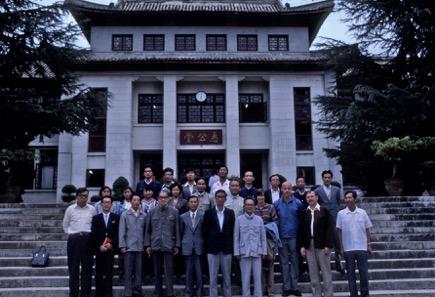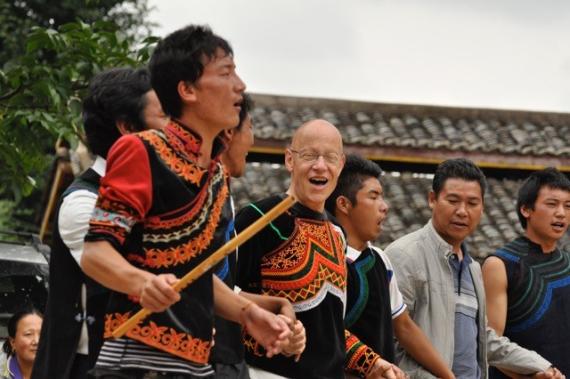Professor Stevan Harrell has been roaming the University of Washington campus, physically and intellectually, since joining the Department of Anthropology in 1974. Professor Harrell chaired the department from 1993-99, and has held appointments as a Curator of Asian Ethnology at the Burke Museum; Professor of China Studies in the Jackson School for International Studies; and Professor in the College of Forest Resources in the School of the Environment. He is a member of several centers (including the Center for Studies in Demography and Ecology) and charity organizations (Cool Mountain Education Fund). He’s spent so much of his time at various cafés, meeting with students from all academic persuasions and pursuing research in all academic directions, that one wonders what he could possibly do next.
We are about to find out. Professor Harrell will retire from the University at the end of Spring Quarter 2017. In anticipation of Steve’s retirement, the Jackson School for International Studies – China Studies Program, held a reception for him on May 16, 2017 where Steve gave an address entitled “What is China?” A retirement conference to celebrate Steve's career and his contributions to the UW and the field of anthropology has been scheduled August 4 through 6. See the Facebook event post for details.
Professor Harrell is an engaging scholar, steady mentor, and top researcher in his field — and a fairly decent singer. His many contributions are reflected in quotes from his colleagues and students, past and present:
-
Steve follows his lively curiosity wherever it leads, and it usually leads him to traverse boundaries — national, linguistic, disciplinary, and institutional. Steve has been remarkably intrepid, adventuresome about finding ways to make things happen that are intellectually compelling, even doing so requires creatively working around and against institutional and bureaucratic structures.
-
From the very beginning of my graduate career, Steve has been a strong advocate for my work, both in terms of intellectual support for my broadly interdisciplinary educational path, and in terms of helping me secure funding for graduate school.
-
Steve has continually and consistently read drafts of papers, dissertation chapters, and grant applications in a timely and constructive manner. In his feedback on my work, Steve always seems to strike just the right balance between granting maximum intellectual freedom and ensuring that I stay on track to complete my dissertation
-
With only a day or two's notice he is always willing to turn out a recommendation letter, review a funding proposal, or sneak in a meeting. His replies to urgent emails are almost frighteningly instantaneous.
-
Steve is among the kindest, generous, stress-free, and egoless professors I have ever known. He cares deeply about the holistic well being of his students and is equally attentive to undergraduates as to his doctoral students
-
I learned about the productive, stimulating possibilities of collaborative teaching and learning in Steve's seminar on resilience theory. I learned about truly applied, committed anthropology each time Steve (typically very offhandedly) described his research partnerships with local community members, or his commitment to equitable, quality education in Liangshan, P.R. China with the Cool Mountain Education Fund.
-
At the field site, Steve led by example; he showed me how he conducted his interviews, and encouraged me to develop my own style as I designed and conduct my own interviews. One of the most valuable aspects of Steve's mentoring is that he allowed me to make mistakes and learn from them, but he stopped me before I went too far off the deep end.
-
No matter how busy he is (and Steve has always been extremely busy!), I can count on him for honest, wise counsel and a quick, effective helping hand.
-
From our very first meeting, Steve has been accessible, engaged and — despite the demands of his own research and teaching — extraordinarily generous with his time. As a fellow researcher and as a human being, I am inspired and intellectually stretched by his example.
-
Professor Harrell has established a non-profit organization to support the education of residents and sustainable development of the village in which he has conducted much of his research, Yangjuan, Sichuan, China. He works tirelessly to raise money to support the education costs of the students in the village. His work in this area has inspired me to be a better global citizen.
-
On more than one occasion, I have doubted my ability to complete my honors work or lacked confidence in my academic aptitude. However, even a ten-minute conversation or a short email with Steve rejuvenates not only my excitement, but my confidence.
-
The occasions on which it has taken more than 24 hours for him to respond to email are incredibly rare and it is more frequently within the hour. He is always available to meet and will talk about anything, while his kind nature and good humor make these conversations easy.
-
His ability to shed light on a difficult concept, capture multiple, apparently divergent ideas and find a novel idea or concept to synthesize them, and to wander easily through content, culture and jargon of multiple disciplines is extraordinary.

Professor Emeritus Charles Keyes recalls: “In 1986, Steve and I were members of a UW delegation who went to China with the purpose of strengthening scholarly relations between UW and several institutions in China. I was the only member of the delegation who did not speak Chinese, but Steve — with his fluent Chinese — kept me in the picture. I realized then how fortunate the UW was to have Steve on the faculty.”
Yes, we have all been extraordinarily fortunate. Steve, you will be missed!
